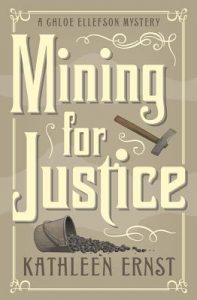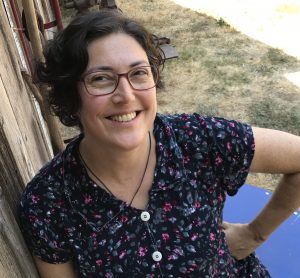 Jenny Jaeckel is the author of House of Rougeaux, her debut novel, which made Bitch Media’s 25 Must Read Books of 2018 list. Her previous titles include For the Love of Meat: Nine Illustrated Stories and Siberiak: My Cold War Adventure on the River Ob. In 2016, Jaeckel published the graphic memoir Spot 12: Five Months in the Neonatal ICU, which was the winner of the 2017 Next Generation Indie Book Awards and a 2016 finalist in the Foreword Indies Book Awards. She has worked as a translator, an editor, a Spanish teacher, a graphic arts teacher, and an illustrator. Jaeckel is currently working on her second novel, yet to be named, a continuation of the Rougeaux family epic.
Jenny Jaeckel is the author of House of Rougeaux, her debut novel, which made Bitch Media’s 25 Must Read Books of 2018 list. Her previous titles include For the Love of Meat: Nine Illustrated Stories and Siberiak: My Cold War Adventure on the River Ob. In 2016, Jaeckel published the graphic memoir Spot 12: Five Months in the Neonatal ICU, which was the winner of the 2017 Next Generation Indie Book Awards and a 2016 finalist in the Foreword Indies Book Awards. She has worked as a translator, an editor, a Spanish teacher, a graphic arts teacher, and an illustrator. Jaeckel is currently working on her second novel, yet to be named, a continuation of the Rougeaux family epic.
And she agreed to be on my little blogblogblog! If you haven’t read House of Rougeaux, I recommend you remedy that as soon as possible—must be ready for the sequel. Links to connect with Jenny and purchase her books follow the interview.
Tell me about your writing process, the mechanics of it, schedule, strategies to keep you going, where you write, research procedures, and what inspirations surround you or motivate you.
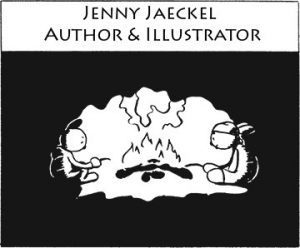 Wow, where to start… All the aspects of the process, whether internal or external are quite varied. As a writer, I have to have a whole mental “team” going on: the passionate one, the researcher, the emotional digger/investigator, the critic, the cheerleader, the scheduler, etc. etc. My biggest inspirations are my favorite books, the ones I love with all my heart and soul, and have made me want to be a writer in the first place. I always aspire to those literary heroes. They function like my North Star. I may be down in my clunky little rowboat, with my one broken oar, paddling furiously and getting nowhere, but when I look up, at least I know where I’m trying to go. J.D. Salinger, Toni Morrison, Merce Rodoreda, Eduardo Galeano, and Edith Wharton are some that I return to again and again.
Wow, where to start… All the aspects of the process, whether internal or external are quite varied. As a writer, I have to have a whole mental “team” going on: the passionate one, the researcher, the emotional digger/investigator, the critic, the cheerleader, the scheduler, etc. etc. My biggest inspirations are my favorite books, the ones I love with all my heart and soul, and have made me want to be a writer in the first place. I always aspire to those literary heroes. They function like my North Star. I may be down in my clunky little rowboat, with my one broken oar, paddling furiously and getting nowhere, but when I look up, at least I know where I’m trying to go. J.D. Salinger, Toni Morrison, Merce Rodoreda, Eduardo Galeano, and Edith Wharton are some that I return to again and again.
Tell me about the publishing process, including your publishing team, and your responsibilities as the author.
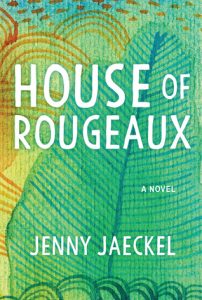 One of the most key parts of the process for me is working with my editor, Neesa Sonoquie. When I first showed her the manuscript for House of Rougeaux, I thought it was in pretty good shape. I’d already gotten some feedback from readers I trusted and done a lot of revising. But I had not worked with Neesa before. She absolutely demolished it. I’d sent off a book and got back confetti. It was humbling, but it turned out to be a transcendent moment. The revision process transformed the book and made me grow tremendously as a writer.
One of the most key parts of the process for me is working with my editor, Neesa Sonoquie. When I first showed her the manuscript for House of Rougeaux, I thought it was in pretty good shape. I’d already gotten some feedback from readers I trusted and done a lot of revising. But I had not worked with Neesa before. She absolutely demolished it. I’d sent off a book and got back confetti. It was humbling, but it turned out to be a transcendent moment. The revision process transformed the book and made me grow tremendously as a writer.
I am currently in such a moment again, because Neesa has just demolished a draft of my next book—a coming-of-age/love story that will be finished before the House of Rougeaux sequel (I’m still working on a first draft of the Rougeaux sequel.) What a good editor does is see the book you are trying to write inside the draft, which is full of wrong detours and other flaws. The demolition is all about cutting the crap so you can get to the true heart of the matter. It’s challenging but very exciting.
Describe your support system online and IRL—who are your biggest cheerleaders?
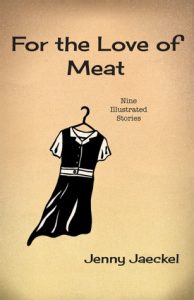 I don’t exactly have a cheerleading squad, but I have a small group of friends and acquaintances who have, at one time or another, said, or written some very wonderful things about how my work has touched them. When I get this in an email, for example, I print it out and put in on the wall by my bed, where I have a little collection, and when I get discouraged, I read them over and over. I also talk pretty regularly with three writer friends of mine. Though we all deal in different genres, the process and the struggle are the same, and being able to engage in that mutual support is essential. My lovely family is very supportive too. My partner and child give me regular feedback on my blog posts and written interviews (like right this second).
I don’t exactly have a cheerleading squad, but I have a small group of friends and acquaintances who have, at one time or another, said, or written some very wonderful things about how my work has touched them. When I get this in an email, for example, I print it out and put in on the wall by my bed, where I have a little collection, and when I get discouraged, I read them over and over. I also talk pretty regularly with three writer friends of mine. Though we all deal in different genres, the process and the struggle are the same, and being able to engage in that mutual support is essential. My lovely family is very supportive too. My partner and child give me regular feedback on my blog posts and written interviews (like right this second).
I know you’ve written about a difficult time in your life through a graphic memoir as part of coping and healing. In what other ways has your life influenced your art and vice versa? How do you choose your subject matter?
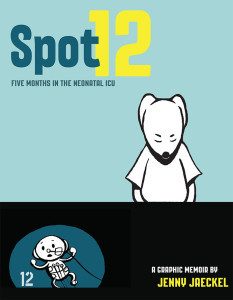 Art and life have a complete interface for me, like body and mind, or heads and tails sides of a coin. My first three books were all memoirs, the next two pure fiction, so while my relationships to all those topics varied, it was all deeply personal. When writing memoir, it has been much easier for me to see the therapeutic aspects of storytelling. Curiously though, putting key chunks of my life into these packages called books has made me identify with the stories less, as if these events happened to a human, and that human just happened to be me. It’s very liberating.
Art and life have a complete interface for me, like body and mind, or heads and tails sides of a coin. My first three books were all memoirs, the next two pure fiction, so while my relationships to all those topics varied, it was all deeply personal. When writing memoir, it has been much easier for me to see the therapeutic aspects of storytelling. Curiously though, putting key chunks of my life into these packages called books has made me identify with the stories less, as if these events happened to a human, and that human just happened to be me. It’s very liberating.
With fiction, though I’ve been exploring lives that couldn’t be more different from my own, every choice I make, and the ways I try to connect with my characters and get to know them, has everything to do with who I am. At the moment, working on this coming-of-age/love story, I am blending autobiography and fiction for the first time, and the process is extremely strange. I have to get to know the protagonist, for example, as the fictional person she is, but she is also so like a young version of myself that it’s a real mind-bender.
What do you love most about your creativity?
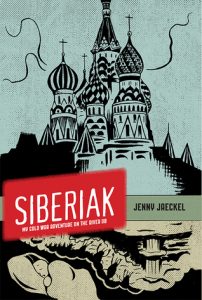 I am grateful to creativity for being the force that animates me. I think without it I’d be a lifeless hulk, a Frankenstein’s Monster pre-electrification, misshapen and covered in scars and moldy clothes (but smaller). I was lucky that as a child I was encouraged in art (so many are discouraged or even shamed for their efforts,) and lucky that since then I’ve had countless opportunities to grow creatively. Creativity takes infinite forms, I think it’s our birthright as human beings, and I think the more we can bring it to all aspects of our lives the better off we are. Once I heard the singer Krishna Das say in an interview that his music was how he stayed alive. He didn’t say music was his bliss and all that, he said it was how he literally stayed alive. I really appreciated that. It’s survival. Creativity is not the icing on the cake, it’s the cake itself.
I am grateful to creativity for being the force that animates me. I think without it I’d be a lifeless hulk, a Frankenstein’s Monster pre-electrification, misshapen and covered in scars and moldy clothes (but smaller). I was lucky that as a child I was encouraged in art (so many are discouraged or even shamed for their efforts,) and lucky that since then I’ve had countless opportunities to grow creatively. Creativity takes infinite forms, I think it’s our birthright as human beings, and I think the more we can bring it to all aspects of our lives the better off we are. Once I heard the singer Krishna Das say in an interview that his music was how he stayed alive. He didn’t say music was his bliss and all that, he said it was how he literally stayed alive. I really appreciated that. It’s survival. Creativity is not the icing on the cake, it’s the cake itself.
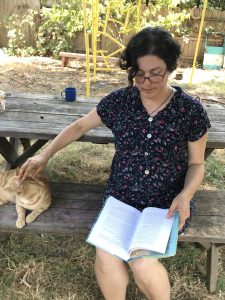 Connect with Jenny:
Connect with Jenny:
website
Twitter
Amazon author page
Goodreads
Instagram
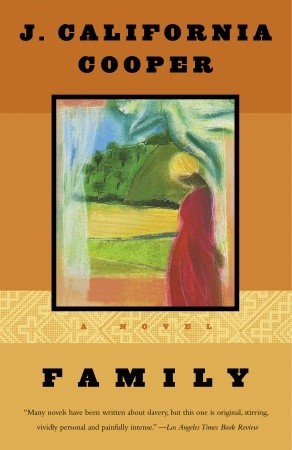
 Jenny Jaeckel is the author of House of Rougeaux, her debut novel, which made Bitch Media’s 25 Must Read Books of 2018 list. Her previous titles include For the Love of Meat: Nine Illustrated Stories and Siberiak: My Cold War Adventure on the River Ob. In 2016, Jaeckel published the graphic memoir Spot 12: Five Months in the Neonatal ICU, which was the winner of the 2017 Next Generation Indie Book Awards and a 2016 finalist in the Foreword Indies Book Awards. She has worked as a translator, an editor, a Spanish teacher, a graphic arts teacher, and an illustrator. Jaeckel is currently working on her second novel, yet to be named, a continuation of the Rougeaux family epic.
Jenny Jaeckel is the author of House of Rougeaux, her debut novel, which made Bitch Media’s 25 Must Read Books of 2018 list. Her previous titles include For the Love of Meat: Nine Illustrated Stories and Siberiak: My Cold War Adventure on the River Ob. In 2016, Jaeckel published the graphic memoir Spot 12: Five Months in the Neonatal ICU, which was the winner of the 2017 Next Generation Indie Book Awards and a 2016 finalist in the Foreword Indies Book Awards. She has worked as a translator, an editor, a Spanish teacher, a graphic arts teacher, and an illustrator. Jaeckel is currently working on her second novel, yet to be named, a continuation of the Rougeaux family epic. Wow, where to start… All the aspects of the process, whether internal or external are quite varied. As a writer, I have to have a whole mental “team” going on: the passionate one, the researcher, the emotional digger/investigator, the critic, the cheerleader, the scheduler, etc. etc. My biggest inspirations are my favorite books, the ones I love with all my heart and soul, and have made me want to be a writer in the first place. I always aspire to those literary heroes. They function like my North Star. I may be down in my clunky little rowboat, with my one broken oar, paddling furiously and getting nowhere, but when I look up, at least I know where I’m trying to go. J.D. Salinger, Toni Morrison, Merce Rodoreda, Eduardo Galeano, and Edith Wharton are some that I return to again and again.
Wow, where to start… All the aspects of the process, whether internal or external are quite varied. As a writer, I have to have a whole mental “team” going on: the passionate one, the researcher, the emotional digger/investigator, the critic, the cheerleader, the scheduler, etc. etc. My biggest inspirations are my favorite books, the ones I love with all my heart and soul, and have made me want to be a writer in the first place. I always aspire to those literary heroes. They function like my North Star. I may be down in my clunky little rowboat, with my one broken oar, paddling furiously and getting nowhere, but when I look up, at least I know where I’m trying to go. J.D. Salinger, Toni Morrison, Merce Rodoreda, Eduardo Galeano, and Edith Wharton are some that I return to again and again. One of the most key parts of the process for me is working with my editor, Neesa Sonoquie. When I first showed her the manuscript for House of Rougeaux, I thought it was in pretty good shape. I’d already gotten some feedback from readers I trusted and done a lot of revising. But I had not worked with Neesa before. She absolutely demolished it. I’d sent off a book and got back confetti. It was humbling, but it turned out to be a transcendent moment. The revision process transformed the book and made me grow tremendously as a writer.
One of the most key parts of the process for me is working with my editor, Neesa Sonoquie. When I first showed her the manuscript for House of Rougeaux, I thought it was in pretty good shape. I’d already gotten some feedback from readers I trusted and done a lot of revising. But I had not worked with Neesa before. She absolutely demolished it. I’d sent off a book and got back confetti. It was humbling, but it turned out to be a transcendent moment. The revision process transformed the book and made me grow tremendously as a writer. I don’t exactly have a cheerleading squad, but I have a small group of friends and acquaintances who have, at one time or another, said, or written some very wonderful things about how my work has touched them. When I get this in an email, for example, I print it out and put in on the wall by my bed, where I have a little collection, and when I get discouraged, I read them over and over. I also talk pretty regularly with three writer friends of mine. Though we all deal in different genres, the process and the struggle are the same, and being able to engage in that mutual support is essential. My lovely family is very supportive too. My partner and child give me regular feedback on my blog posts and written interviews (like right this second).
I don’t exactly have a cheerleading squad, but I have a small group of friends and acquaintances who have, at one time or another, said, or written some very wonderful things about how my work has touched them. When I get this in an email, for example, I print it out and put in on the wall by my bed, where I have a little collection, and when I get discouraged, I read them over and over. I also talk pretty regularly with three writer friends of mine. Though we all deal in different genres, the process and the struggle are the same, and being able to engage in that mutual support is essential. My lovely family is very supportive too. My partner and child give me regular feedback on my blog posts and written interviews (like right this second). Art and life have a complete interface for me, like body and mind, or heads and tails sides of a coin. My first three books were all memoirs, the next two pure fiction, so while my relationships to all those topics varied, it was all deeply personal. When writing memoir, it has been much easier for me to see the therapeutic aspects of storytelling. Curiously though, putting key chunks of my life into these packages called books has made me identify with the stories less, as if these events happened to a human, and that human just happened to be me. It’s very liberating.
Art and life have a complete interface for me, like body and mind, or heads and tails sides of a coin. My first three books were all memoirs, the next two pure fiction, so while my relationships to all those topics varied, it was all deeply personal. When writing memoir, it has been much easier for me to see the therapeutic aspects of storytelling. Curiously though, putting key chunks of my life into these packages called books has made me identify with the stories less, as if these events happened to a human, and that human just happened to be me. It’s very liberating. I am grateful to creativity for being the force that animates me. I think without it I’d be a lifeless hulk, a Frankenstein’s Monster pre-electrification, misshapen and covered in scars and moldy clothes (but smaller). I was lucky that as a child I was encouraged in art (so many are discouraged or even shamed for their efforts,) and lucky that since then I’ve had countless opportunities to grow creatively. Creativity takes infinite forms, I think it’s our birthright as human beings, and I think the more we can bring it to all aspects of our lives the better off we are. Once I heard the singer Krishna Das say in an interview that his music was how he stayed alive. He didn’t say music was his bliss and all that, he said it was how he literally stayed alive. I really appreciated that. It’s survival. Creativity is not the icing on the cake, it’s the cake itself.
I am grateful to creativity for being the force that animates me. I think without it I’d be a lifeless hulk, a Frankenstein’s Monster pre-electrification, misshapen and covered in scars and moldy clothes (but smaller). I was lucky that as a child I was encouraged in art (so many are discouraged or even shamed for their efforts,) and lucky that since then I’ve had countless opportunities to grow creatively. Creativity takes infinite forms, I think it’s our birthright as human beings, and I think the more we can bring it to all aspects of our lives the better off we are. Once I heard the singer Krishna Das say in an interview that his music was how he stayed alive. He didn’t say music was his bliss and all that, he said it was how he literally stayed alive. I really appreciated that. It’s survival. Creativity is not the icing on the cake, it’s the cake itself. Connect with Jenny:
Connect with Jenny: After a glimpse into her future as a leader of her people, this family saga opens with the childhood of the great Obeah, Meme Abeje, who lives to see the official end of slavery in her homeland of Martinque, and her niece Hetty’s migration to Canada, where she becomes an abolitionist with husband Dax Rougeaux. After a quick (and confusing) foray into the future of the Rougeaux family in the mid-1940s, Hetty’s granddaughter Eleanor brings the story full circle, when she visits Martinique to honor her Obeah great-great aunt at the end of the 19th century.
After a glimpse into her future as a leader of her people, this family saga opens with the childhood of the great Obeah, Meme Abeje, who lives to see the official end of slavery in her homeland of Martinque, and her niece Hetty’s migration to Canada, where she becomes an abolitionist with husband Dax Rougeaux. After a quick (and confusing) foray into the future of the Rougeaux family in the mid-1940s, Hetty’s granddaughter Eleanor brings the story full circle, when she visits Martinique to honor her Obeah great-great aunt at the end of the 19th century.